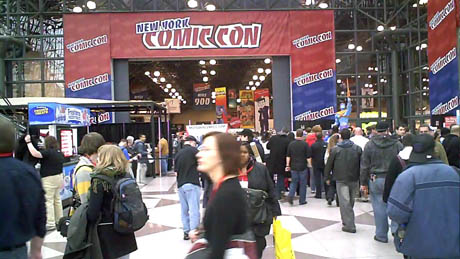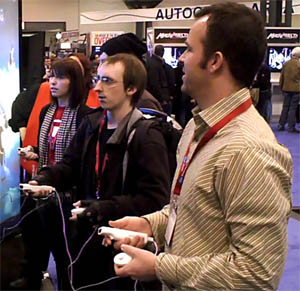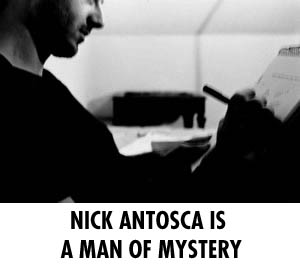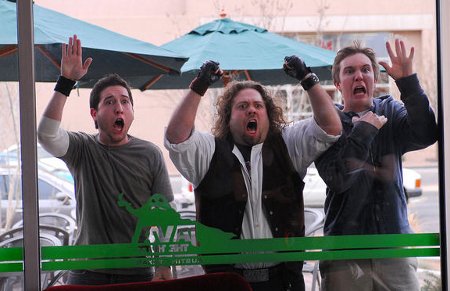Mr. Tanenhaus, while we profoundly disagree on a number of points, I must echo the sentiments of my colleague. Your concerns, interests, and curiosity are clearly within politics, and the time has come for you to resign from the New York Times and take a chance. It is abundantly clear from the thoughtful and striking qualities of your New Republic piece that politics, not literature, is your beat. Your heart is in finishing the Buckley bio, not in books. Your literary hero, John Updike, is dead. And you clearly aren’t interested in any the emerging literary talents. So why continue to pretend?
But here’s the good news. There are plenty of people who can do what you cannot on the literary front. And with Democrats now controlling a sizable stretch within the Beltway, there are plenty of conservatives who cannot do what you can do on the politics front. If you wish to flail the sheets of conservatism and get a movement going, would such linen-shaking be best served in your current sinecure at the New York Times? Or would it better served through work carried out at The New Republic and other publications? I may be a liberal, but frankly a number of my progressive friends and colleagues could use a few swift kicks in the ass. Right now, there is no better candidate than you to puncture the complacency that has settled in among certain sectors of the Obama camp, who still genuinely believe that questioning even a few notions of Obama’s decisions do not involve the gestures of a natural skeptic, but a liberal drifting right. Like Jefferson, I like a little rebellion now and then. Natural storms must inhabit any partisan atmospheres if the American system is to remain honest. And while we both rest on different wings, I sense that you feel the same way.
Would not the sparring that you once unsuccessfully attempted by assigning Leon Wieseltier to write an ad hominem attack on Nicholson Baker be better served through politics? I’m sure you know by now that what works for politics does not always work for books. Humorless and austere writing — that Burkean tone you so admire and attempt to employ, often stubbornly, within the Review — does not blend particularly well with the fun and bipartisan possibilities of literary journalism. But it does work for politics.
I know what you’re thinking, Mr. Tanenhaus. Did the Democrats fire six shots or only five? Well, to tell you the truth, in all this excitement I kind of lost track myself. But being as this current political climate represents a .44 Magnum pointed in your direction, the most powerful handgun in the world, and would blow your head clean off, you’ve got to ask yourself a few questions. Do I cower away from the principles with which I’ve lived my life? Or do I accept who I am and write and work with my strengths in mind?
Do I feel lucky? Well, do ya, punk?


 “New York Comic Con” may be something of a misnomer. Almost a third of the floor is now dominated by noisy and intrusive monitors promoting loud and distracting video games. I’m not against video games. But I am against this needless intrusion on basic communication. I was at the Tor Books booth today talking with a number of nice people, and we all were forced to shout at the top of our lungs just to be heard. What is this? E3? The fans, of course, play alone. And just watch their faces. Caught in the glowing rapture of a next-generation game engine. But can’t they play this stuff at home nine months later when the title gets released? And why aren’t they talking with each other? Who did they come with? Why aren’t they meeting other fans? Is the primordial fire that compelling? Will they sign their names to some mailing list to be bombarded by promotional material?
“New York Comic Con” may be something of a misnomer. Almost a third of the floor is now dominated by noisy and intrusive monitors promoting loud and distracting video games. I’m not against video games. But I am against this needless intrusion on basic communication. I was at the Tor Books booth today talking with a number of nice people, and we all were forced to shout at the top of our lungs just to be heard. What is this? E3? The fans, of course, play alone. And just watch their faces. Caught in the glowing rapture of a next-generation game engine. But can’t they play this stuff at home nine months later when the title gets released? And why aren’t they talking with each other? Who did they come with? Why aren’t they meeting other fans? Is the primordial fire that compelling? Will they sign their names to some mailing list to be bombarded by promotional material?

 Correspondent: You also bring up one moment in the book, where you depict Senator John Stennis — the man, of course, who wrote one of the first Senate ethics codes; in fact, the first Senate ethics code. And who had not raised more than $5,000 for all of his campaigns in the past. Now here he is up for reelection in 1982. And he needs to raise $2 million. He is now forced to accept this devil’s bargain. This leads me to wonder whether, in fact, there is even room for a Sam Rayburn type of Congressman anymore. Whether it’s even possible for someone of any ethical core to be in this deeply ingrained system. If John Stennis can’t do it, then who can?
Correspondent: You also bring up one moment in the book, where you depict Senator John Stennis — the man, of course, who wrote one of the first Senate ethics codes; in fact, the first Senate ethics code. And who had not raised more than $5,000 for all of his campaigns in the past. Now here he is up for reelection in 1982. And he needs to raise $2 million. He is now forced to accept this devil’s bargain. This leads me to wonder whether, in fact, there is even room for a Sam Rayburn type of Congressman anymore. Whether it’s even possible for someone of any ethical core to be in this deeply ingrained system. If John Stennis can’t do it, then who can?




 Reid: You don’t want to burden people with this depressing stuff. So the blog is just my little haven to finally be honest with myself about how I felt.
Reid: You don’t want to burden people with this depressing stuff. So the blog is just my little haven to finally be honest with myself about how I felt.


 The cracked light turquoise paint clings to the gneiss on the Bronx side of Spuyten Duyvil Creek, forming the canvas for a stenciled C, a character cloud with a silver lining representing Columbia University. I can report with some small relief that elite rowers are in short supply on a cold February afternoon. But the Amtrak trains that roll across the bridge to the west of the Henry Hudson can be seen emerging on the Bronx side and disappearing behind the Big C. While the rock itself has defiantly exacted fissures through serious chunks of this not-quite-elliptical letter, the paint sits truer near the stems. And you can walk a good hard slog through Inwood Hill Park, slipping on the presently icy trails under the Henry Hudson Bridge leading southwest to Dyckman Street, and not know a damn thing about how the C came to be. You’ll run into friendly geese, with their sinuous necks jutting as slow and methodical and as graceful as their struts, and encounter a number of maps displaying city department propaganda about all the forest preservation going on. But what of the origins of C Rock itself? Nothing. An unknown letter defying history, standing some sixty feet tall but somehow still managing to upstage the large chunks of ice now breaking in the water.
The cracked light turquoise paint clings to the gneiss on the Bronx side of Spuyten Duyvil Creek, forming the canvas for a stenciled C, a character cloud with a silver lining representing Columbia University. I can report with some small relief that elite rowers are in short supply on a cold February afternoon. But the Amtrak trains that roll across the bridge to the west of the Henry Hudson can be seen emerging on the Bronx side and disappearing behind the Big C. While the rock itself has defiantly exacted fissures through serious chunks of this not-quite-elliptical letter, the paint sits truer near the stems. And you can walk a good hard slog through Inwood Hill Park, slipping on the presently icy trails under the Henry Hudson Bridge leading southwest to Dyckman Street, and not know a damn thing about how the C came to be. You’ll run into friendly geese, with their sinuous necks jutting as slow and methodical and as graceful as their struts, and encounter a number of maps displaying city department propaganda about all the forest preservation going on. But what of the origins of C Rock itself? Nothing. An unknown letter defying history, standing some sixty feet tall but somehow still managing to upstage the large chunks of ice now breaking in the water.